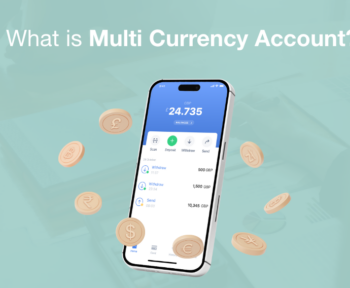Know Your Customer or KYC as a popular finance term is generally related to the compliance processes of financial institutions. KYC in crypto exchange is also becoming increasingly popular due to the age of decentralization.
Platforms that conduct transactions through cryptocurrency exchanges and entrust their assets to customers are a regulatory element implemented to prevent possible fraud cases, money laundering operations or financing of malicious groups such as terrorism.
Crypto KYC refers to the regulation that prevents such possible illegal uses from being made through cryptocurrency exchanges or platforms due to their decentralized finance ecosystem.
In this way, security is maintained in cryptocurrency exchanges as in traditional banking ecosystems. Every customer in the ecosystem has gone through the identity verification process and the number of suspicious transactions is minimized.
Crypto KYC is an important requirement in the modern world where cryptocurrencies and crypto-friendly banks are becoming more and more widespread every day. Join us in this blog as we explore KYC in crypto exchanges in detail and learn about the essentials!
Crypto KYC in Detail
Thanks to crypto KYC applications, every customer on cryptocurrency exchanges is verified by the platforms. The crypto world is a digital world where transactions are managed with cryptocurrencies instead of fiat currencies in traditional banks.
Today’s world, as an example of a decentralized finance ecosystem, allows many users to manage their investments quickly, flexibly, and transparently. However, this decentralization is sometimes used by malicious people.
At this point, crypto KYC applications offer permanent solutions. However, although these applications provide security, they raise discussions about the damage they do to the decentralized working principles, privacy advantage, and anonymity opportunity of cryptocurrencies.
Many no-KYC platforms continue to offer anonymity and decentralized transaction flexibility. However, traders who trade on these platforms should be aware of the risk of waking up one morning and encountering the fact that all their funds are gone.
Or they should know that they will not be able to compensate for their losses in possible wrong transaction cases. For this reason, it would be best to evaluate the speed and flexibility offered by cryptocurrencies within the KYC security ecosystem.
How Does KYC Work?
So how should the clear and simple answer to the question “How does KYC work?” be given? Although the functioning of regulatory elements such as KYC may seem complicated at first glance, there is a basic operating mechanism. The steps of KYC can be listed as follows:
- Registration: During the registration process, customers prepare the documents requested by the crypto exchange they choose.
- Verification process: Documents containing personal identification information such as identity, address, income statement, and passport are verified.
- Address Verification: Although not on every crypto exchange, some platforms also perform address verification processes and verify whether the address information provided by each individual within their customer ecosystem is correct through official sources.
- Approval process and account opening: At the final stage, platforms check the compliance of all documents with regulations.
If they do not detect any incompatibility issues, the account is opened. This process may vary on different platforms. However, KYC generally works this way.
Why Does Crypto Need KYC?
Crypto exchanges, just like the traditional banking ecosystem, must provide minimum security. In the modern world, thousands of investors trade on cryptocurrency exchanges.
This has facilitated the management of financial processes of illegal transactions such as fraud, terrorism financing, and money laundering with decentralized finance opportunities.
In order to transform this ecosystem into a secure platform like traditional banking ecosystems, crypto KYC is needed. If we need to give summarized answers to the question “Why does crypto need KYC?”, we can list them as follows:
- Preventing money laundering operations
- Preventing terrorism financing
- Compliance of cryptocurrency exchanges with regulatory rules
- Reducing fraud cases to 0.
Thanks to crypto KYC applications, these goals are achieved, and cryptocurrency exchanges can become as reliable platforms as traditional financial networks.
If we want crypto exchanges to be widespread and popular in financial environments just like traditional banks, we must enable the implementation of certain legal processes and standards in these exchanges. In this case, the high investor profile will also be interested in this market and will invest, ensuring the development of these exchanges.

Is KYC Safe in Crypto?
The correct answer to the question “Is KYC safe in crypto?” should of course be “Yes!” Because cryptocurrency exchanges, just like traditional banks, have become a large market where thousands of investors trade every day.
This has created a legal basis and regulation requirement to ensure that it is a safe ecosystem. KYC is also applied to crypto exchanges as a valid regulatory element on a global scale. Investors in the crypto world may occasionally have concerns about whether their personal data is protected.
However, thanks to KYC practices, there are no customers in the ecosystem that the platform does not approve of. “No KYC crypto exchange” services can be provided on some platforms, although privacy is at a high level, security-related problems are also possible on these platforms.
Some users who want to escape the control mechanisms in traditional banking solutions aim to manage their illegal financial transactions with crypto exchanges. However, crypto exchanges, just like traditional banks, must maintain certain legal regulations and compliance.
Today, crypto exchanges serving in many developed countries are required to implement Know Your Customer processes online. Platforms that serve as “no KYC crypto exchanges” unfortunately do not offer a secure ecosystem.
Jeton is a platform that complies with KYC standards and other security regulations. With Jeton, you can also transfer assets to accounts around the world quickly and securely in minutes and receive your payments.
What Are the Benefits of Crypto KYC?
Crypto KYC applications have many benefits for both customers and platforms. Sample answers to the question, What are the benefits of crypto KYC? can be listed as follows:
- Each customer going through the identity verification process makes it easier to detect and track fraud cases.
- There is transparency within the financial ecosystem.
- Facilitating solutions to legal and regulatory issues
- It becomes possible for large investor profiles to enter these markets.
- Crypto KYC applications are important not only for creating a legal basis but also for the security of investors.
Why Is KYC Important for Crypto Exchanges?
Know your customer (KYC) is a regulatory element that requires financial platforms and crypto exchanges to recognize customers in financial ecosystems. The main reason why KYC is important for crypto exchanges is that it is essential for the security of users and the platform.
Although there are many “no KYC crypto exchange” examples today, trading on these platforms is not a reliable option for high investor profiles.
While experiencing the opportunities of blockchain technologies and the flexibility of decentralized financial systems, it is possible to experience the secure environment of traditional banking thanks to KYC applications.
KYC processes are mandatory on many crypto platforms today. Thanks to the “crypto KYC” process, crypto exchanges get to know their entire customer base. This also provides valuable data for them.
It also makes it easier to provide customized and personalized services for each customer. However, platforms that do not implement KYC applications look quite suspicious from the outside.
Does KYC Affect Anonymity and Decentralization?
Although KYC applications ensure the security of crypto exchanges by ensuring the verification of each customer and transaction, the anonymity and decentralization advantages offered by blockchain solutions are also negatively affected.
One of the main reasons for the establishment and popularity of cryptocurrency exchanges was that transactions could be made anonymously. However, this anonymity has caused the financial processes of transactions such as money laundering, terrorist financing, fraud, and illegal betting to be managed through crypto exchanges in recent years.
In order to prevent these, crypto exchange platforms use KYC applications. However, there are still many different “no KYC crypto exchange” platforms on the market for investors who want to evaluate the flexibility of decentralization in this regard.
They can make anonymous transactions through these platforms. However, it should not be forgotten that these platforms contain many risks.
However, in the years when cryptocurrencies were introduced and launched, anonymity and decentralization were promoted as some of the biggest advantages of trading with these digital asset classes.
At some point, these ecosystems, just like traditional banking elements, faced some regulatory sanctions. These developments beyond what was promised may have most likely been due to the proliferation of cryptocurrencies and their transformation into a popular asset class.
You can access opportunities in different markets around the world and catch cash flow by downloading the easy-to-use mobile application offered by Jeton. Businesses save up for their cross-border payment costs with Jeton solutions.

Do Crypto Wallets Need KYC Compliance?
Generally, the tools that allow cryptocurrency exchanges to convert fiat currencies into cryptocurrencies are called digital wallets or crypto wallets. Most of them do not have KYC applications.
However, since they are used when investing in cryptocurrency exchanges through crypto wallets, they must indirectly comply with KYC practices. Among digital wallets, it is possible to be independent of KYC applications thanks to software such as self-custody wallets.
Hardware wallets are also popular types of crypto wallets. KYC applications are not performed in these wallets, which provide concrete protection of crypto assets.
However, when transactions are wanted to be made through these digital wallets, KYC compliance is requested. Not directly in the wallet, but in the connected services of the wallets, KYC compliance is definitely mandatory.
What Does Non-KYC Mean?
The term “no KYC crypto exchange” simply refers to processes where platforms where crypto transactions can be made do not verify customers’ addresses and identity information. In other words, non-KYC examples generally do not have to Know Your Customer applications and provide anonymity for users.
No KYC crypto exchange refers to platforms that do not require identity verification. No KYC wallets are digital wallets used without identity verification. These solutions are generally suitable for investors who want to evaluate the advantages of anonymity and decentralization.
However, they are not completely safe environments legally. There are many non–KYC crypto examples in different parts of the world. The number of these platforms used to be higher. Today, many official states have made KYC processes mandatory for crypto exchanges with the regulations they offer.
You can choose reliable digital payment platforms like Jeton for your global money transfer processes or payment needs including cryptocurrencies. You can create your Jeton account in minutes and manage all your global asset transfers 24/7, even with a mobile phone.
Can You Trade Crypto Without a KYC?
Yes, it is possible to make transactions without Know Your Customer regulatory steps through no KYC platforms. Today, the number of digitally decentralized exchanges is quite high. You should research the no KYC ones among these exchanges and manage your trade transactions through these platforms.
However, we should remind you that these platforms are not completely legally secure. One of the biggest advantages provided by cryptocurrencies was the opportunity to be anonymous within the decentralized ecosystem.
Thanks to this feature, users experienced great flexibility in commercial and financial processes. However, this anonymity increased the number of illegal transactions, such as money laundering and terrorist financing.
For this reason, cryptocurrency exchanges apply KYC regulations and steps, just like reliable financial institutions in the traditional banking ecosystem.
However, despite all these risk factors and security threats, investors who want to continue crypto trade transactions without KYC practices can reach a solution through no-KYC crypto exchanges.
What Is the Risk of No KYC?
There are many risks involved in No KYC crypto platforms and No KYC transactions. The most obvious ones can be listed as follows:
- Fraud Risk: Since there is no verification in exchanges where identity checks are not performed, transactions on behalf of someone else and fake accounts may be more common.
- Money laundering operations: Organizing operations such as tax evasion and money laundering makes the job of financial monitoring units difficult.
- Inability to Recover Losses: In a platform where there are no KYC standards, it is very difficult to compensate for the financial losses experienced legally in possible losses.
- Possibility of losing all savings: In a possible regulation or legal audit, the platform may be closed and all your funds may be lost.
Choosing a platform that offers crypto KYC practices can be an important recommendation to prevent such risks. KYC is the cornerstone of safety in the crypto world, and Jeton makes it effortless.
You can evaluate the returns you get from crypto exchanges in your digital transfers as you wish with Jeton. Verify. Secure. Transact with confidence. With one app for all your needs, Jeton offers a single account for all your payments—secure, transparent, and globally accessible.
Join 1M+ happy users who already enjoy:
- Instant and borderless payments
- Multi-currency support for seamless global transactions
- Jeton Card for contactless payments, spending limits, and card freezing for extra control
- Top-level security, including KYC and Two-Factor Authentication
No hidden fees, no complicated processes—just better money management at your fingertips. Open your Jeton account today and experience a smarter, safer way to manage your crypto and payments.
Download the Jeton App on Google Play or the App Store and make money better—anytime, anywhere!


